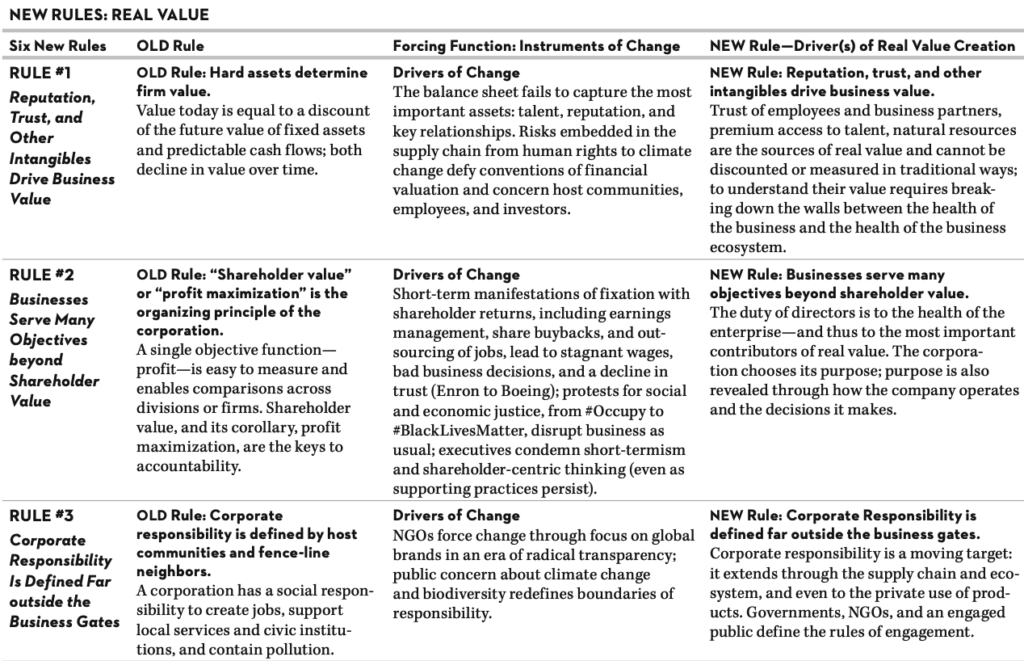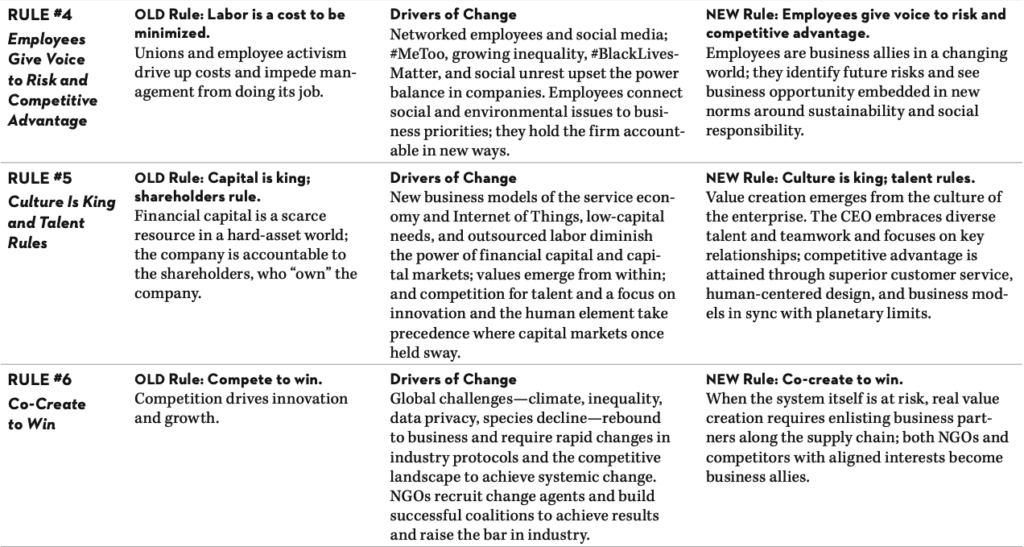 By Judy Samuelson
By Judy Samuelson
Tell me which of the pressing issues of our time keep you awake at night, and I will tell you how the old rules of profit maximization and short-term thinking contribute to those problems.
Globe-hopping brands with big footprints and deep supply chains and the extensive reach of industry, technology, and commerce touch virtually every aspect of our lives. Climate change is a product of industrial processes. It is a problem with unimaginable consequences that cannot be solved without collective action; it now tops the list of global concerns. We can easily connect the dots between consumers shopping on the basis of price, low-cost labor markets, and the working conditions where human rights violations and even human trafficking persist. The economics of overconsumption and unsustainable growth create boom-and-bust cycles that favor some but push others to the side. Marketing of unhealthy products. Tax avoidance. Obesity. Our infatuation with guns. Food waste. Deforestation. Pervasive inequality and its consequences.
For good or for ill (and it’s both), global business—talent-rich, capacious, and connected—is the most influential institution of our age, akin to the Church in the Middle Ages. Clues to the power of business are found in daily headlines and in politics.
We need a new script.
This book offers a different—and more useful—set of rules that can transform the game of business. And it provides stories about how the game is already changing according to the new rules.
The rules followed by corporations aren’t set in one place, like the Vatican. They emerge from Congress, regulatory agencies, and trade associations. They are set by investors with different time frames and definitions of a fair return on investment (ROI), and by outside activists, internal agitators, and purchasing agents who are under pressure to redefine the narrative about business success. But, ultimately, they emerge from business itself—they are a function of embedded assumptions, decision rules, protocols, and incentive systems that shape intentions and behavior.
Yet, it is also true that the rules and expectations that companies choose to follow are unquestionably tied to the belief that shareholders own the firm and that clarity of managing to a single objective of shareholder value leaves us all better off. The evidence to the contrary is overwhelming, but systems change is hard, especially when the ideology is reinforced by the tenure system in classrooms and myriad forces in boardrooms.
The old rules derive from the power of the shareholder mindset. The new ones are derivative of the change that is enabled when other, more powerful contributors to value creation are revealed. The threads of this conversation about corporate purpose are woven throughout the rules that mark the chapters of this book.
The underlying narrative about the purpose of the corporation, and the practices and mindset that give shareholder primacy its power, are giving way, at last, to the reality that business and society are truly codependent. New, future-oriented sources of power and influence are already affecting the game, and a new cadre of business leaders are redefining business success. Business schools are catching up with boardrooms wrestling with a new road map—one that points the way to new measures of progress and is consistent with the values of the new generation preparing to lead.
The old rules paid off, at least for a while. This book is about the changes—the forces that are conspiring both inside businesses and in the business ecosystem—that enable executives to think and manage differently. It is about the consequences for businesses that fail to embrace the new rules and a new definition of business success.
The new rules are already written. The forcing mechanisms described in this book and summarized in the chart that follows this introduction give them staying power. Change agents both outside and inside the enterprise are rethinking protocols and decision rules for investment and business strategy.
It’s time to play by the new set of rules.



Excerpted and adapted from The Six New Rules of Business: Creating Real Value in a Changing World by Judy Samuelson. Copyright 2020. Reprinted with permission of Berrett-Koehler Publishers.
________

Judy Samuelson is a VP at the Aspen Institute, founder and executive director of the Aspen Institute’s Business and Society Program, and author of The Six New Rules of Business: Creating Real Value in a Changing World.
